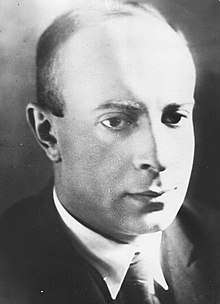Yuliy Meitus
This article needs additional citations for verification. (May 2022) |
Yuliy Meitus | |
|---|---|
 | |
| Style |
|
Yuliy Serhiyovych Meitus (Ukrainian: Юлій Сергійович Мейтус; 28 January 1903, Yelysavethrad – 2 April 1997, Kyiv), was a Soviet and Ukrainian composer, considered the founder of the Ukrainian Soviet opera. His early style was modernistic, later he used more traditional neo-Romantic idioms.[1]

Meitus was born to a Jewish family. In 1919 he graduated from the School of Music in piano from Heinrich Neuhaus, and from the Kharkiv Institute of Music and Drama in the composition class of C. Bogatyrenko in 1931. During World War II he was evacuated to the Turkmen SSR. Meitus made his debut in film in 1932. He is famous for his 18 operas, a number of orchestral works and about 300 songs on Ukrainian and Russian classical poems,[2] among them Stolen Happiness, the epic Yaroslav the Wise, Daughter of the Wind, Leila and Majnun, The Young Guard and Abakan. He was buried in the Baikove Cemetery.
Awards and honors
[edit]- Honored Art Worker of the Turkmen SSR (1944)
- Honored Art Worker of the Ukrainian SSR (1948)
- Stalin Prize, 2nd class (1951)
- Two Orders of the Red Banner of Labour (1960, 1971)
- People's Artist of the Ukrainian SSR (1973)
- Order of Friendship of Peoples (1983)
- Shevchenko National Prize (1991)
- Medal "For Labour Valour"
References
[edit]- ^ Biografija. Мейтус Юлий Сергеевич (in Russian). Biografija.ru. Retrieved 1 July 2012.
- ^ Kino-teatr. Мейтус Юлий Сергеевич (in Russian). Kino-teatr.ru. Retrieved 1 July 2012.
External links
[edit]- Юлий Мейтус — возвращение в родной город on ZN,UA (in Russian)
- 1903 births
- 1997 deaths
- Musicians from Kropyvnytskyi
- Communist Party of the Soviet Union members
- Recipients of the title of People's Artists of Ukraine
- Recipients of the Order of Friendship of Peoples
- Recipients of the Order of the Red Banner of Labour
- Recipients of the Shevchenko National Prize
- Recipients of the Stalin Prize
- Soviet film score composers
- Soviet male classical composers
- Soviet opera composers
- Ukrainian classical composers
- Ukrainian composers
- Ukrainian film score composers
- Ukrainian opera composers
- Burials at Baikove Cemetery
- Ukrainian people stubs
